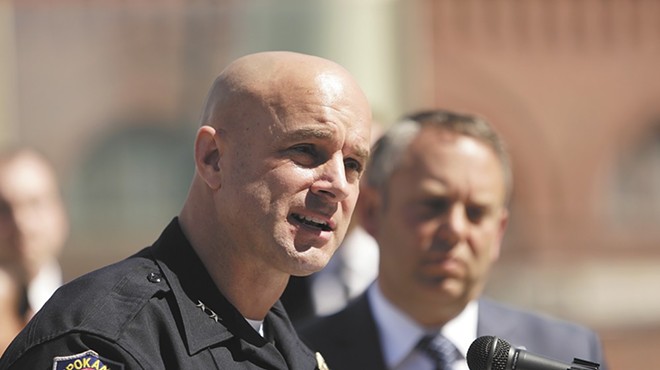Wednesday, March 18, 2015
First round of police race data is in
Back in 2012, Captain Brad Arleth of the Spokane Police Department approached Ed Byrnes, a professor at Eastern Washington University. Arleth wanted to know if it was possible to track interactions between police officers and citizens by race. Three years later, the two are ready to present findings from the first five months of data collection. The results are less than flattering for the SPD, but Byrnes and Arleth are optimistic.
Byrnes delivered the analysis of the first five months of data to a room full of local community leaders Tuesday. According to data from March to July 2014, Spokane police officers initiate contact with African Americans and Native Americans at a disproportionately higher rate than their representation of Spokane's population, which is 2.5 percent and 1.7 percent respectively. African Americans and Native Americans are the only two over represented racial groups.
Spokane Police are also more likely to search and arrest those two racial groups than any other. However, there are two findings in the data that are cause for optimism: there was not a disproportionality among racial groups in instances where officers had to use force, and only 4 percent of searches were "officer safety searches." The rest were done leading up to or after an arrest, which is standard protocol, Arleth says.
"This is part of our process for transparency," says Chief Frank Straub. "We need the broader community to help us explore these issues."
Although the overall results showed SPD officers giving disproportionate attention to people of color, many of those in attendance applauded Arleth and Byrnes' efforts. They see the data as the first step in initiating conversations about race and policing.
"I am so proud of living in Spokane and having a police department that's so proactive in addressing these issues that are so critical," says Gloria Ochoa, a local attorney and director of local government and multicultural affairs for the mayor's office. "Other communities are not as fortunate as we are. The numbers don't look good, but if you know what you're working with, it's a starting point."
The full report of Byrnes' research can be viewed below, but we'll break down some main points:
- African Americans came into contact with police in 6.1 percent of the 7,021 recorded interactions despite comprising only two and a half percent of the total population.
- Native Americans accounted for three percent of police interactions even though they make up less than two percent of the population. For comparison, white people are 87.1 percent of the population, and accounted for 84.6 percent of police contacts.
- African Americans account for 10.4 percent of searches. Native Americans account for 8.4 percent of searches.
- African Americans accounted for 10.9 percent of arrests (despite being only 6.1 percent of total police contacts) and Native Americans accounted for 7.6 percent of arrests (despite being only three percent of total police contacts). For comparison, whites make up 76.4 percent of arrests, but 84.7 percent of all contacts.
- Finally, the study reveals the possibility for optimism as race was not found to be a significant factor in reasons civilians are arrested or searched.
Byrnes began collecting data last March, and plans to release another report that will include a year's worth of interactions this fall. The data is collected through a computer program loaded onto squad car computers each time an officer initiates contact with a civilians and there is at least the possibility of detaining them.
"I just want to make it really clear that the data I present and continue to collect in the future is by no means intended to be an inclusive finding," Byrnes says. "It's always meant to be a stimulator of conversation."
[Ed. note: This post was updated March 19 to clarify some language on the report's findings]
Civilian-Police Encounter Analysis - Spokane Police Department & Eastern Washington University
Tags: SPD , race , Chief Straub , Ed Byrnes , Brad Arleth , News , Image




















